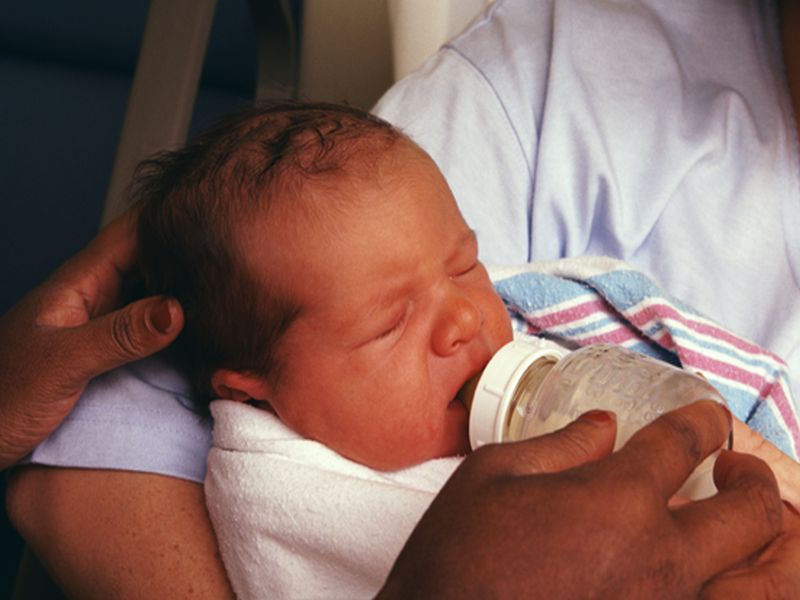

Most Cow's Milk Baby Formulas Don't Up Risk of Type 1 Diabetes
But one type of formula may be linked to greater chances if given in week 1, study suggestsThursday, January 19, 2017

THURSDAY, Jan. 19, 2017 (HealthDay News) -- Although breast milk is still considered the best nutrition for babies, a new study suggests that most cow's milk formulas don't increase the risk of developing type 1 diabetes.
However, the German researchers who did the study did find that giving highly hydrolyzed formulas -- sometimes recommended for babies with food allergies -- in the first week of life may increase the chances of type 1 diabetes in some children.
"There is no benefit for infants at increased genetic risk for type 1 diabetes to be fed hydrolyzed infant formula as a first formula if breast-feeding is not possible," said lead author Sandra Hummel, from the Institute of Diabetes Research in Munich.
The study wasn't designed to prove a cause-and-effect relationship between cow's milk baby formula and the development of autoantibodies that can trigger type 1 diabetes.
And it's important to note that type 1 diabetes is believed to be caused by more than one factor, diabetes experts explained.
"This is one piece of the puzzle, and their conclusions are pretty mild. There's probably not going to be one single thing that's shown to be the cause of type 1 diabetes," said Jessica Dunne. She's the director of discovery research for JDRF -- formerly the Juvenile Diabetes Research Foundation.
Highly hydrolyzed formulas are formulas that contain cow's milk proteins that aren't whole -- they're already at least partially broken down, according to the American Academy of Pediatrics.
According to Hummel, the molecular weight of cow's milk proteins differs by formula. It's lightest for the highly hydrolyzed formulas and heaviest for the standard formulas, she explained.
Partially or highly hydrolyzed formulas also tend to be more expensive than standard infant formulas.
The researchers initially thought to look at cow's milk-based formulas because cow's milk has been previously implicated as a possible risk factor for type 1 diabetes. However, past studies have had mixed results, so it's still not clear if there's a connection, the study authors said.
Type 1 diabetes is an autoimmune disease. That means the body's immune system mistakenly attacks healthy cells in the body. In type 1 diabetes, the immune system destroys insulin-producing islet cells. That leaves the body unable to produce enough insulin, a hormone necessary for cells to be able to use the sugars from foods as fuel.
The autoantibodies that destroy the islet cells are called islet autoantibodies. These antibodies are often evident before the signs and symptoms of type 1 diabetes surface.
The new study used data from a long-term study of children who are at high-risk of developing type 1 diabetes. It includes almost 9,000 children who have a gene that suggests an increased risk of type 1 diabetes. The children were followed from birth through age 8, according to Hummel.
The children come from four countries. Three sites are in the United States. One is in Finland, another is in Germany, and the final site is in Sweden.
The researchers found that regular cow's milk formula, partially hydrolyzed and even highly hydrolyzed formulas given during the first three months of life weren't linked to a higher risk of type 1 diabetes.
But, when highly hydrolyzed formulas were given during the first seven days of life, the study showed that the chances of islet autoimmunity went up 57 percent.
There are a number of potential reasons that this type of formula could raise the risk of type 1 diabetes, according to Dunne. "It may have to do with early immune education. It could be the gut microbiome [the bacteria normally living in the intestine], but there's no smoking gun," she said.
Most of the extensively hydrolyzed formula use -- 80 percent -- was in Finland. Dunne said the researchers took this into account, and still saw a link.
Dunne suggested that parents who have a family history of type 1 diabetes have a conversation with their pediatrician about what formula would be best if they need to use baby formula.
The findings were published online Jan. 17 in the journal Diabetes Care.
SOURCES: Sandra Hummel, Ph.D., group leader, gestational diabetes, Institute of Diabetes Research, Munich, Germany; Jessica Dunne, Ph.D., director, discovery research, JDRF, New York City; Jan. 17, 2016, Diabetes Care
HealthDay
Copyright (c) 2017 HealthDay. All rights reserved.
News stories are written and provided by HealthDay and do not reflect federal policy, the views of MedlinePlus, the National Library of Medicine, the National Institutes of Health, or the U.S. Department of Health and Human Services.
- More Health News on:
- Diabetes Type 1
- Infant and Newborn Nutrition



























.jpg)












No hay comentarios:
Publicar un comentario